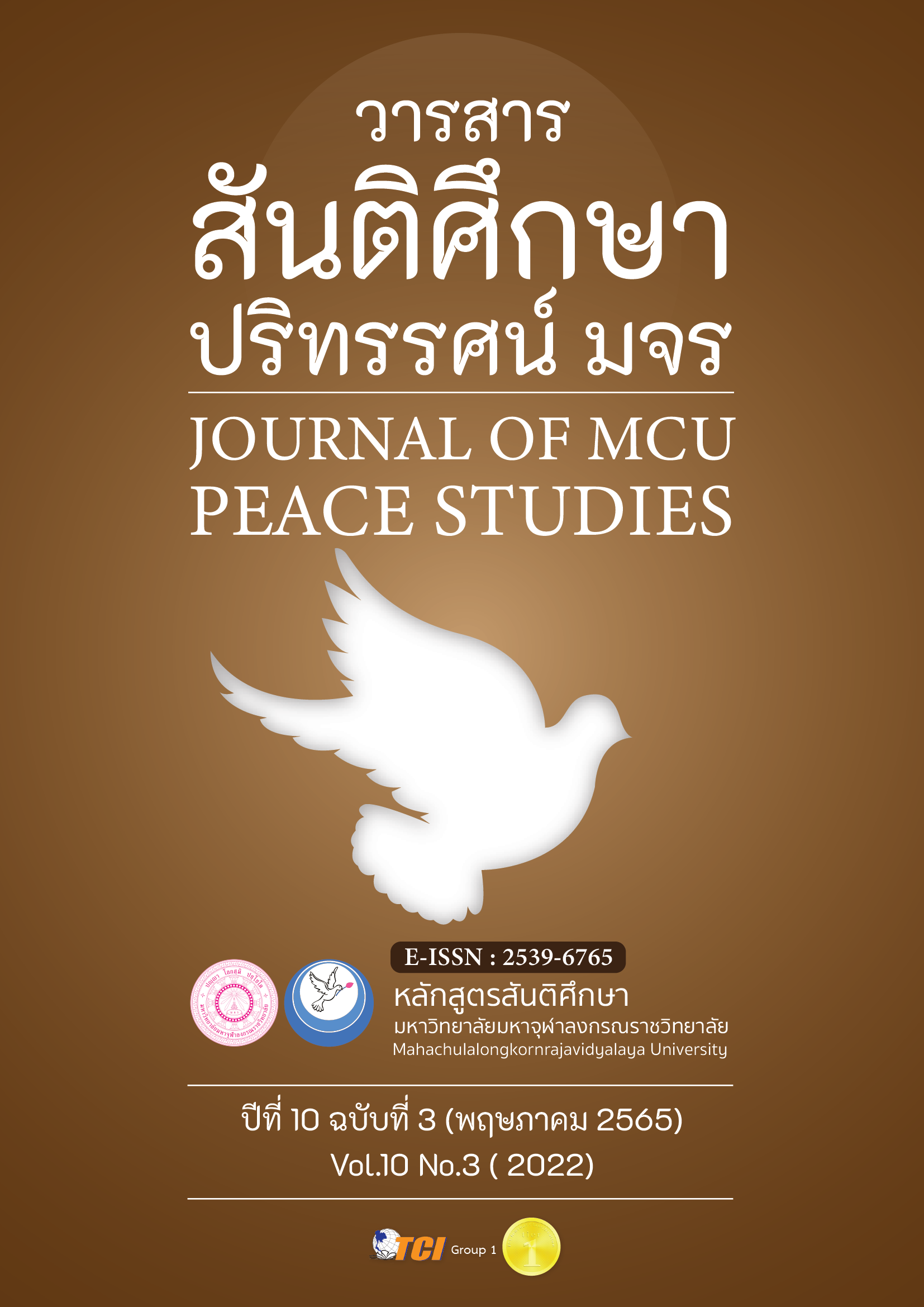รูปแบบการจัดการเรียนรู้แนวจิตตปัญญาศึกษาแบบออนไลน์เพื่อเสริมสร้าง ทักษะชีวิตของนักเรียนชั้นมัธยมศึกษาปีที่ 1 โรงเรียนหนองกองพิทยาคม อำเภอเมือง จังหวัดกำแพงเพชร
Main Article Content
บทคัดย่อ
บทความวิจัยนี้มีวัตถุประสงค์ 1) เพื่อเปรียบเทียบทักษะชีวิตของนักเรียนชั้นมัธยมศึกษาปีที่ 1 ก่อนและหลังเข้าร่วมใช้รูปแบบการจัดการเรียนรู้แนวจิตตปัญญาศึกษาแบบออนไลน์ 2)เพื่อศึกษาทักษะชีวิตของนักเรียนชั้นมัธยมศึกษาปีที่ 1 ภายหลังการเข้าร่วมใช้รูปแบบการจัดการเรียนรู้แนวจิตตปัญญาศึกษาแบบออนไลน์ เป็นการวิจัยผสานวิธีแบบขั้นตอนเชิงอธิบาย กลุ่มตัวอย่าง ได้แก่ นักเรียนชั้นมัธยมศึกษาปีที่ 1 จำนวน 24 คน ซึ่งได้มาด้วยวิธีการสุ่มแบบกลุ่ม ส่วนกลุ่มผู้ให้ข้อมูล ได้แก่ นักเรียนที่เข้าร่วมทดลอง จำนวน 5 คน ได้มาด้วยวิธีการเลือกแบบเจาะจง เครื่องมือที่ใช้ในการวิจัยประกอบด้วย 1)แบบสอบถามทักษะชีวิต 2) รูปแบบการจัดการเรียนรู้แนวจิตตปัญญาศึกษาแบบออนไลน์และ 3)แบบสัมภาษณ์กึ่งโครงสร้างด้านทักษะชีวิต สถิติที่ใช้ ได้แก่ ค่าเฉลี่ย ส่วนเบี่ยงเบนมาตรฐาน Nonparametric ด้วยเทคนิค Wilcoxon signed Rank test และการวิเคราะห์เนื้อหา
ผลการวิจัยพบว่า 1) ทักษะชีวิตของนักเรียนชั้นมัธยมศึกษาปีที่ 1 โดยใช้รูปแบบการจัดการเรียนรู้แนวจิตตปัญญาศึกษาแบบออนไลน์หลังเรียนสูงกว่าก่อนเรียนอย่างมีนัยสำคัญทางสถิติที่ระดับ .05 2) ภายหลังการเข้าร่วมใช้รูปแบบการจัดการเรียนรู้แนวจิตตปัญญาศึกษาแบบออนไลน์ ผู้เรียนเกิดการตระหนักรู้ตนเองและเข้าใจคนอื่นมากขึ้น สามารถคิดวิเคราะห์และรู้จักแยกแยะข้อมูลด้วยหลักการและเหตุผล มีการตัดสินใจอย่างสร้างสรรค์ รู้จักควบคุมอารมณ์และพฤติกรรมที่ไม่เหมาะสมของตนเองได้ มีเทคนิคในการจัดการกับความเครียดได้ดี รู้จักสร้างสัมพันธภาพและอยู่ร่วมกับคนอื่นได้อย่างเป็นปกติสุข
Article Details

อนุญาตภายใต้เงื่อนไข Creative Commons Attribution-NonCommercial-NoDerivatives 4.0 International License.
ทัศนะและความคิดเห็นที่ปรากฏในบทความในวารสาร ถือเป็นความรับผิดชอบของผู้เขียนบทความนั้น และไม่ถือเป็นทัศนะและความรับผิดชอบของกองบรรณาธิการ ยินยอมว่าบทความเป็นลิขสิทธิ์ของวารสาร
เอกสารอ้างอิง
Boonphak, K. (2020). Learning Management in New Normal Era. Journal of Industrial Education, 19(2), 1-6.
Choosai, S. (2013). Effects of Using Contemplative Education Learning Process in Course of “Human Behavior and Life Skills Development”. Research in Educational Psychology and Guidance. (Research Report). Phetchbun: Phetchabun Rajabhat University.
Department of Health. (2020). Approach of Practice for Education Institute in Protection of Covid-16 Pandemic in Thailand. Retrieved March 20, 2022, from http://www.oic.go.th/FILEWEB/CABINFOCENTER17/DRAWER002/GENERAL/DATA0002/00002647.PDF
Jantakoon, J. (2017). The Effect of Learning Activities Based on Contemplative Education Approach on the Development of Local Curriculum of the University of Phayao Student Teachers’ Competency. Journal of Community Development Research (Humanities and Social Sciences), 10(4), 168-199.
Linphoo, M., & Siri, S. (2021). The Promotion of Courtesy of the Teaching Professional Teacher Student Based on Integrated Contemplative Education. Sisaket Rajabhat University Journal, 15(2), 146-157.
Office of the Basic Education Commission. (2009). Approach for Developing Life Skill Integrated the Instruction of Eight Learning Material Group. Bangkok: Bureau of Academic Affairs and Educational Standards Office of the Basic Education Commission, Ministry of Education.
Office of the Basic Education Commission. (2015). Approach of Activity Arrangement for Life Skill Development for Drug Cased Immunity. Bangkok: The Agricultural Co-operative Federation of Thailand.
Pinid, P., & Anmanakul, A. (2015). Learning Management Procedure Based on Contemplative Education in Academic Writing Subject. King Mongkut’s University of Technology Thonburi: Jaransanidwongkanpim.
Podapol, C. (2022). Online Learning Management: New Normal of Education. Retrieved March 15, 2022, from https://slc.mbu.ac.th/wp-content/uploads/2020/06/การเรียนรูKออนไลน7-ดร.จักรกฤษณ7-โพด.pdf
Prajapati, R., Sharma, B., & Sharma, D. (2017). Significance of Life Skills Education. Contemporary Issues in Education Research, 10(1), 1-6.
Ratanathirakul, A. (2009). The Construction of E-learning System with Moodle (Complete Copy). Bangkok: Se-education.
Soaraso, J., & Sawangpoon, T. (2017). The Development of Promoting Self-Discipline Program on Contemplative Education for Intellectual Disability Students, Mattayomsuksa 3, Kalasin Pannanukun School. Journal of Education Evaluation of Mahasarakam University, 23(2), 64-72.
Srichat, Y., & Piyakun, A. (2020). The Development of Emotional Quotient of Mathayomsuksa 1 Students Using Contemplative Education Activities. Journal of Graduate School, 17(77), 149-157.
Srisuwan, S. (2018). Learning Management Based on Contemplative Education for Reaching the Humanship of Mass Communicator. Proceeding of National Conference “Active Learning”. Retrieved March 20, 2022, from https://alc.wu.ac.th/backEnd/attach/attArticle/Proceeding2561-198-204.pdf
Unicef. (2021). Module 7 Life Skills. Retrieved March 21, 2022, from https://www.unodc.org/pdf/youthnet/action/message/escap_peers_07.pdf
Wongphiromsan, Y., & Ruengkanjanased, S. (2009). Life Skills. Bangkok: Division of Mental Health Promotion and Development.
World Health Organization. (1996). Life Skills Education Planning for Research. Retrieved March 23, 2022, from https://apps.who.int/iris/bitstream/handle/10665/338491/MNH-PSF-96.2.Rev.1-eng.pdf


